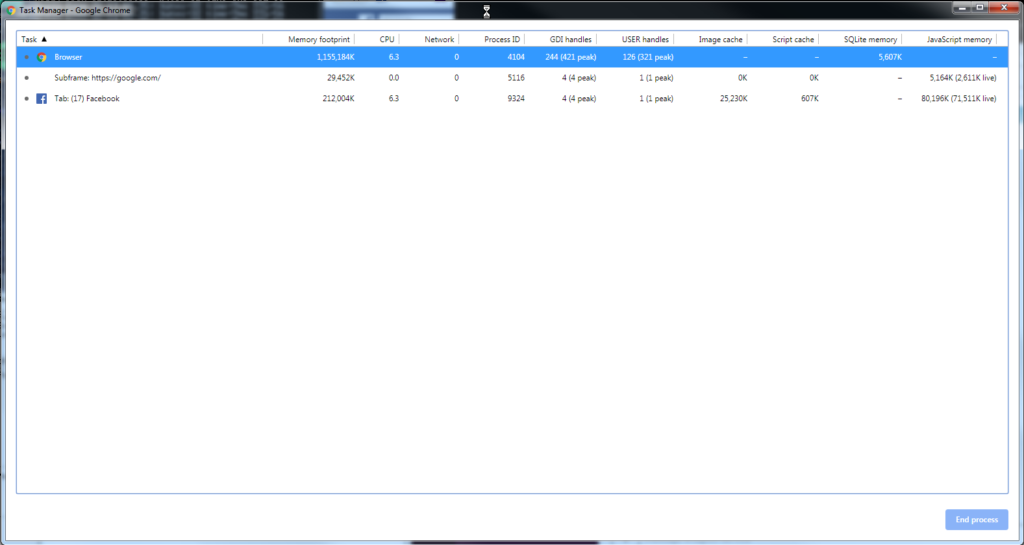I have been using Chrome for many years now, having become a convert from Firefox when it first came out. But it has been getting to be a persistent pain on a number of fronts, and I have almost reached my Popeye moment, where “I have had all I can stands, and I can stands no more…”
One of the first items which started becoming an issue was the memory use. Some time back, Chrome started getting really bad about is memory use, and it became even more visible when it started breaking out every… single… frelling… frame… on… every… single… tab. And this was true even if the tab had been in the background for hours, such as ones for Facebook, PHP.net, Python.org or whatever I happen to be working on that day. But routinely, Chrome is using over 2GB of RAM on my laptop with 4GB, even when I have just half a dozen tabs open (FB, 2 gmail, Nagios, Jenkins, and this one), having recently restarted, I have this in the task manager…

Notice how much the browser itself is using… 625MB… roughly the amount of an entire frelling CDROM. And I have not even done any real scrolling on any of these!!! But shortly before this, I had the following, from where I had last night been working with Jenkins builds, reading email, watching a few YouTube videos, and replying to some friends posts on FB… and then killed all the tabs before going to bed, rather than just restarting the browser.

Yes, your eyes are not deceiving you… over 1GB of RAM for just the browser itself.
Now, is it a memory leak, or what?? I think that given the 625MB which it started at, it is more just a design issue. And the reason I say this is that I have seen similar design issues, like MicroSoft wanting to load an entire 9GB database into memory when you wanted to back it up, or all the infamous “blue screen of death” crashes, or countless others by many other companies. And why is this?? In this case, it is because I have long been used to working with programs and having resource limits which both the application and the operating system itself put into place. If I want to open a 512MB log file, depending on various things, I can either be told “No, you need to break the file down into smaller parts”, or I get asked if I really want to open that large of a file. And at one point, browsers used to have controls on how much space they would use, both on disk and in memory, before they would just reload things from the network. But following in the infinitesimal wisdom of MicroSoft, Apple and others, things have gone beyond the point of hiding settings in a screen someplace, to in some cases, just making it something you cannot set, or have to use some poorly, if not undocumented command line option which requires changing something in the windows registry or in the shortcut properties (if you are on one of those platforms). But it forgets that basic idea of resource limits… if any site goes over a certain size in terms of memory usage, just like good operating systems and well designed applications do, Chrome should be saying “Are you really sure”, or be saying “This site wants to use too much memory, click here to adjust the limit for this site”. And, there needs to be a better way to collect information about all the browser tasks, and a better way to pass this information back to the development team. And more fundamentally, Chrome should support putting tabs to sleep when they have not been active for more than a short time, and especially getting all the frames under control. (But let us be honest… they will not, because Chrome comes from Google, which makes obscenely massive amounts of money from ads of all forms, and I think we all have seen the news articles such as this, and so to put them to sleep and potentially reduce their revenue…not likely.) But there is more to my growing dissatisfaction than just with the memory usage.
Another issue is that with the latest couple of updates, Chrome has not been filling in passwords which I have told it to save. It would be one thing if my passwords were a mix of things like “42 is the answer!”, “G0 Buckeyes!” and such, but they are not. My “simple” passwords might be like ‘<F7FZihp’ or ‘tqBfj0tf’ (if I have to type them… that last being an example of using letters from a memorable phrase such as “the quick brown fox jumped over the fence”, then playing with numbers and letters. But then, more often, I am using passwords like ‘?~<$7B62NO$n$+;;LU:,’, consisting of something between 16 and 24 characters (depending on the site, or perhaps more), generated and stored by a program, and also remembered and supplied by my browser… WHEN THE FRELLING BROWSER WORKS!!! And as you can guess, the past few updates of Chrome have not been working. And while one might ask “Well, did they change the login form?” or other things, I know it is this way across the board… even on sites which I have written. Even my test sites, residing behind a firewall and absolutely inaccessible, use passwords like these.
And another issue is speed. This one seems to be worse when the browser is sucking up memory, so I suspect partly that the Windows 7 box I use much of the time is in such a bruised and battered state, that it is like two boxers who have gone 15+ rounds, cannot see, can barely stand, much less do what they are expected to do… routinely, I see pages taking 20-30 seconds to load, with no clues if it is the browser, Windows and its network stack (which would also include the antivirus software), or what. I really should look into things like what the server side sees with a packet trace sometime, but most of the time, I am mainly doing something else, and bringing up some documentation, responding to a message somebody sent me on FB, pulling up an email, or something else… and I know it is not my network… my servers are all reachable and talking among themselves fine, my FTTP connection is fairly idle, etc. And so…
But given all this, I am seriously considering moving back to Firefox as my primary browser.
